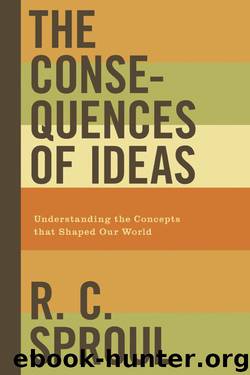The Consequence of Ideas by Sproul R. C

Author:Sproul, R. C. [Sproul, R. C.]
Language: eng
Format: epub
Tags: ebook, book
Publisher: Crossway
Published: 2009-06-08T07:00:00+00:00
Figure 8.1
Hume’s Illustration from Pocket Billiards
We remember that the law of causality simply declares that every effect must have an antecedent cause. This law is analytically true and irrefutable—it is true by definition. An effect is, by definition, something that is caused, just as a cause is, by definition, something that yields an effect. Of course this does not in itself prove that there is such a thing as causality. For example, if we lived in a world where there were no effects, then there would also be no causes. Or, if we lived in a world where there were no causes, then there would be no effects. But if we live in a world where there are effects, then there must also be causes. The only world in which there are no effects and no causes would be a world in which everything is self-existent. Again, this does not mean that everything or anything in the world would be self-caused. Remember that something cannot be its own cause, or be a cause and effect at the same time and in the same relation. Indeed, something could be both a cause and an effect at the same time, but not in the same relationship. The cue ball could be at the same time the cause of the movement of the object ball and the effect of having been struck by the cue stick. But here the cue ball is not both cause and effect in the same respect or relationship.
Hume’s main point is that neither cause nor effect can be objective qualities, since anything can be considered either a cause or an effect, depending on the point of view. Since the idea of causality arises through the process of relation, we have no original sensation or impression of causality itself. Since we cannot directly perceive the cause of anything, we can never know with certainty what is causing it.
Experts argue over whether Hume actually denies causality or is content to show that we cannot know that A causes B—that no object implies the existence of another when we consider objects individually. Hume may be correct with respect to the idea of objects. But the idea of cause itself necessarily implies the idea of effect, and vice versa. This again is a formal truth.
When Hume, in his skepticism, declares that anything can produce anything, we have to ask what he means by the term produce? Is this not merely another word for cause? It is important that Hume rules out chance as a possible cause for anything, understanding that the word chance is a substitute for the word ignorance.
Hume’s skepticism goes beyond the realm of pure causality to the ideas of the self, substance, and God, because none of these can be discovered by an original sensation or impression. Hume denies that we have any idea of the self, which is like saying I have no idea of I. But it’s not that simple. Here he speaks in terms of an original idea based on impression or sensation.
Download
This site does not store any files on its server. We only index and link to content provided by other sites. Please contact the content providers to delete copyright contents if any and email us, we'll remove relevant links or contents immediately.
The Lost Art of Listening by Michael P. Nichols(7506)
Why I Am Not A Calvinist by Dr. Peter S. Ruckman(4153)
The Rosicrucians by Christopher McIntosh(3521)
Wicca: a guide for the solitary practitioner by Scott Cunningham(3179)
Signature in the Cell: DNA and the Evidence for Intelligent Design by Stephen C. Meyer(3138)
Real Sex by Lauren F. Winner(3023)
The Holy Spirit by Billy Graham(2953)
To Light a Sacred Flame by Silver RavenWolf(2823)
The End of Faith by Sam Harris(2742)
The Gnostic Gospels by Pagels Elaine(2531)
Waking Up by Sam Harris(2461)
Nine Parts of Desire by Geraldine Brooks(2369)
Jesus by Paul Johnson(2363)
Devil, The by Almond Philip C(2333)
The God delusion by Richard Dawkins(2309)
Heavens on Earth by Michael Shermer(2285)
Kundalini by Gopi Krishna(2185)
Chosen by God by R. C. Sproul(2165)
The Nature of Consciousness by Rupert Spira(2108)
